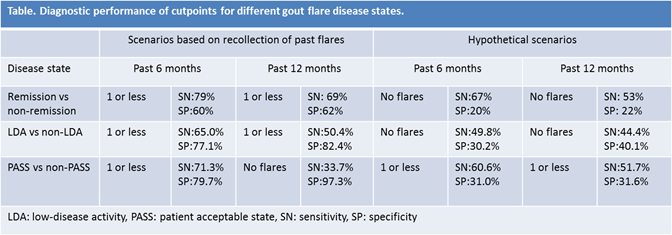Session Information
Date: Sunday, November 13, 2016
Title: Metabolic and Crystal Arthropathies - Poster I: Clinical Practice
Session Type: ACR Poster Session A
Session Time: 9:00AM-11:00AM
Results from an International Study
Background/Purpose: Attacks (flares) are one of the primary manifestations of gout. It is not known how infrequently gout flares need to occur for patients to consider their disease to be in remission, in a state of low activity (LDA), or in an acceptable state (PASS). In addition, it is not clear what time horizon should be used to determine these disease activity states. The aim of this study is to estimate the patient-perceived frequency of gout flares associated with disease activity states along with a clear time-horizon for these estimates
Methods: We enrolled 374 individuals with gout from 15 international sites in a cross-sectional study. We inquired about flare frequencies in the past 6 and 12 months and actual and hypothetical perception of disease states: remission (“gout is gone”), LDA (“gout control is satisfactory”) or acceptable state (“gout requires no more treatment”) with relation to flares. Data from one half of the group (discovery group) was used to estimate the best discriminatory cutpoints to distinguish remission vs. non-remission, LDA vs. no-LDA, and PASS vs. no-PASS using logistic regression. We then applied these estimates to the second half of the group (validation group) to calculate sensitivity and specificity of these thresholds. Results at 6 and 12-month recollection intervals were compared. Results: The mean age of participants was 52.7 years (SD 13.9), 90.2% were men, and 33.2% had tophi. Participants reported experiencing a median of 2 (IQR 0-4) and 3 (IQR 1-8) flares in the 6- and 12-month preceding period, respectively. From the flare perspective, 24.5% of and 22.6% of participants reported that their gout was in remission. Flare frequency thresholds for disease states were lower with asking the participants about hypothetical (imagined) scenarios than when with their past recollection of disease states within the validation cohort (Table). Recollection of one flare or less in the prior 6 and 12 month periods provided the best predictive cutpoints between a between being or no being in remission, LAD, or PASS (Table). Responses at 6 and 12 months had comparable performance.
Conclusion: Recollection of one flare or less in the previous 6-month period provides the best discrimination for patient-reported gout flare remission state, although the diagnostic performance of this threshold is limited. A 12-month recall period does not outperform a 6-month recall period for assessing gout flare disease states.
To cite this abstract in AMA style:
Gaffo AL, Dalbeth N, Saag KG, Singh J, Rahn EJ, Mudano AS, Neogi T, Cavagna L, Chen YH, Lin CT, Louthrenoo W, Castelar-Pinheiro G, Perez-Ruiz F, Vazquez-Mellado J, Eliseev M, Stamp LK, Taylor W. Patient Perception of Gout Flares As a Measure of Outcome: Results from an International Study [abstract]. Arthritis Rheumatol. 2016; 68 (suppl 10). https://acrabstracts.org/abstract/patient-perception-of-gout-flares-as-a-measure-of-outcome-results-from-an-international-study/. Accessed .« Back to 2016 ACR/ARHP Annual Meeting
ACR Meeting Abstracts - https://acrabstracts.org/abstract/patient-perception-of-gout-flares-as-a-measure-of-outcome-results-from-an-international-study/

